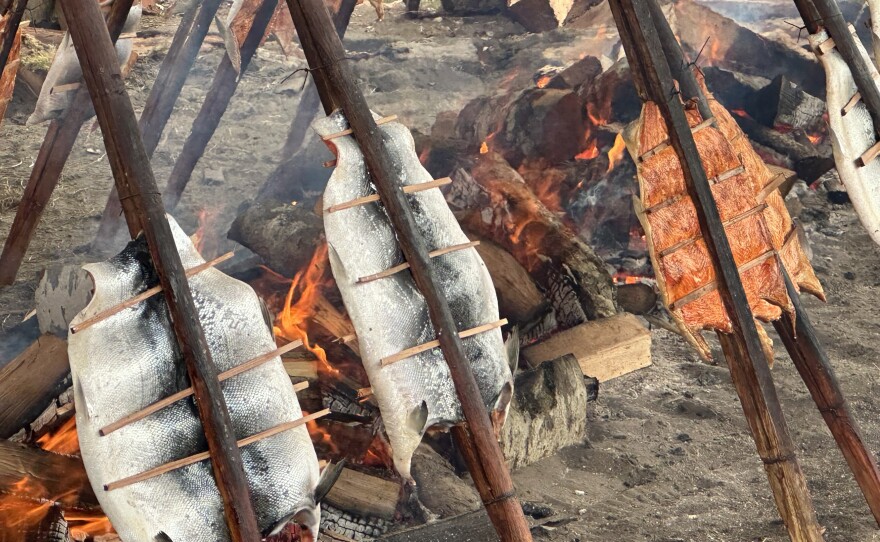This past weekend, the tiny Makah tribe welcomed home far-flung relatives and guests, for the 100th annual Makah Days festival in Neah Bay.
Every year, the town on the northwesternmost tip of Washington state's Olympic Peninsula comes alive with the 3-day celebration. It commemorates the federal law that gave all Native Americans U.S. citizenship and gave them back the right to practice their culture.
Makah Days is a smorgasbord of culture, open to anyone who’s curious and filling multiple venues for hours and often into the night.
The weekend is packed. There’s a parade with Makah royalty, softball and cornhole tournaments, a talent show, a race up a mountain peak, and bone games that go all night long. The whole festival melds modern and ancient traditions. Kids and adults spend months practicing traditional dances and putting together their regalia.
Lifelong tribal member Mary Hunter said she looks forward to it every year.
“Because that's how we are. We live in this world and we live in the other world,” she said.
For decades colonists and settlers made it illegal for Makah people, and other tribes, to practice their culture.
“The government had told us, no dancing, no using your language, no singing your songs, no gathering – you have to become like us. And this was the one day of the year – two days of the year that we could be who we are.”
After the annual flag raising ceremony, in which the U.S. and Makah flags are hoisted simultaneously, Makah Vice Chairman Chad Bowechop told a cheering crowd that it won’t be much longer till they see the tribe’s highest spiritual practice happening once again.
“What we want you to recognize is: yes! Makah’s on duty! And Makah will revive the whale hunt, we are a whaling people,” he exclaimed.
In May, after a decades-long legal effort, the tribe got a waiver from the federal government that paves the way for a renewed hunt, as soon as next year. Whaling is a Makah treaty right and excitement about it was palpable.
“That would be amazing, if I'm the next face of the next whale hunt,” said 17-year-old Elijah Parker, who was crowned this year’s Makah Days Warrior. He was wearing the whaling hat that his father, Theron Parker, wore in 1999 as the harpoonist for the last Makah hunt.
“This cape I'm wearing right now: I made it out of cedar– I hand pounded it myself, cut it, stripped it, and everything like that. Made it all myself,” he said.
The annual crowning of tribal royalty, in multiple age groups, is another highlight of Makah Days. The representatives serve as cultural role models and are judged on their dedication to traditional dancing, language skills and regalia.
19-year-old Angel Buckingham was crowned this year’s Makah Days Queen. She said she’s been preparing for this since she could barely walk. She previously served as a Makah Princess and as Junior Miss– and her great-grandmother was the very first queen in 1954.
She said she likes to imagine her ancestors’ big celebration – that also went on all day and all night, 100 years ago, after decades of keeping the culture underground.
“It gives me goosebumps thinking about how that could have felt, how that did feel to our ancestors, and how excited they felt. And I know they had to have felt a lot of freedom,” Buckingham said.
She said those ancestors are now looking down on Makah Days, proudly. And she’s thankful to be part of an Indigenous culture that is still here - and thriving.












